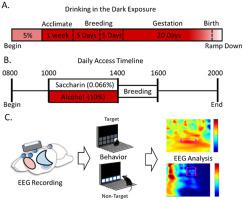Neuropharmacology ( IF 4.6 ) Pub Date : 2023-05-20 , DOI: 10.1016/j.neuropharm.2023.109599 Sarah L Olguin 1 , James F Cavanagh 2 , Jared W Young 3 , Jonathan L Brigman 1

|
Although it is well established that alcohol consumption during pregnancy can lead to lifelong difficulties in offspring, Fetal Alcohol Spectrum Disorders (FASD) remain a common neurodevelopmental syndrome. Translational behavioral tools that target similar brain circuits across species can facilitate understanding of these cognitive consequences. Touchscreen behavioral tasks for rodents enable easy integration of dura recordings of electroencephalographic (EEG) activity in awake behaving animals, with clear translational generalizability. Recently, we showed that Prenatal Alcohol Exposure (PAE) impairs cognitive control on the touchscreen 5-Choice Continuous Performance Task (5C-CPT) which requires animals to touch on target trials (hit) and withhold responding on non-target trials (correct rejection). Here, we extended these findings to determine whether dura EEG recordings would detect task-relevant differences in medial prefrontal cortex (mPFC) and posterior parietal cortex (PPC) corresponding with behavioral alterations in PAE animals. Replicating previous findings, PAE mice made more false alarm responses versus controls and had a significantly lower sensitivity index. All mice, regardless of sex or treatment, demonstrated increased frontal theta-band power during correct trials that followed an error (similar to post-error monitoring commonly seen in human participants). All mice showed a significant decrease in parietal beta-band power when performing a correct rejection versus a hit. PAE mice of both sexes showed a significantly larger decrease in parietal beta-band power when successfully rejecting non-target stimuli. These findings suggest that moderate exposure to alcohol during development can have long lasting effects on cognitive control, and task-relevant neural signals may provide a biomarker of impaired function across species.
中文翻译:

产前适度饮酒后认知控制受损对应于啮齿动物触摸屏连续执行任务期间脑电图功率的改变
尽管众所周知,怀孕期间饮酒可能会导致后代终生困难,但胎儿酒精谱系障碍 (FASD) 仍然是一种常见的神经发育综合征。针对跨物种相似大脑回路的转化行为工具可以促进对这些认知后果的理解。啮齿类动物的触摸屏行为任务可以轻松整合清醒行为动物的脑电图 (EEG) 活动的硬脑膜记录,并具有清晰的翻译概括性。最近,我们发现产前酒精暴露 (PAE) 会损害触摸屏 5 选择连续表现任务 (5C-CPT) 上的认知控制,该任务要求动物触摸目标试验(命中)并保留对非目标试验的反应(正确拒绝) )。在这里,我们扩展了这些发现,以确定硬脑膜脑电图记录是否可以检测与 PAE 动物行为改变相对应的内侧前额叶皮层 (mPFC) 和后顶叶皮层 (PPC) 的任务相关差异。重复之前的发现,PAE 小鼠与对照组相比做出了更多的误报反应,并且敏感性指数显着降低。所有小鼠,无论性别或治疗,在错误后的正确试验中都表现出额叶 θ 带功率增加(类似于人类参与者中常见的错误后监测)。当执行正确的拒绝与命中时,所有小鼠的顶叶β带功率均显着下降。当成功拒绝非目标刺激时,两种性别的 PAE 小鼠的顶叶 β 带功率均表现出显着更大的下降。 这些发现表明,在发育过程中适度接触酒精会对认知控制产生长期持续的影响,而与任务相关的神经信号可能提供跨物种功能受损的生物标志物。

































 京公网安备 11010802027423号
京公网安备 11010802027423号